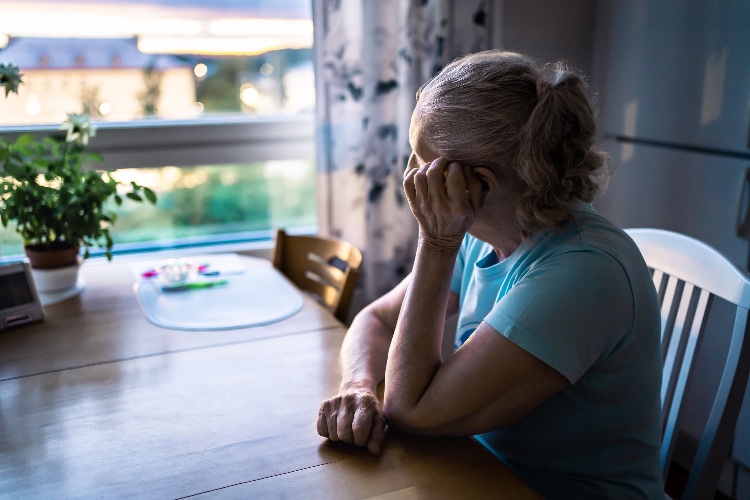
Stress in older adults often flies under the radar. It doesn’t always look like panic or worry, instead, it might show up as poor sleep, physical discomfort, forgetfulness, or a lack of interest in things that once mattered. These signs are easy to miss or explain away, especially when they’re mistaken for the natural effects of aging.
But when stress goes unaddressed, it can take a toll on both mental and physical well-being. That’s why paying attention to these shifts is important.
Table of Contents
- Physical Changes That Might Be Stress-Related
- Changes in Sleep Patterns
- Increased Irritability or Mood Shifts
- Memory Lapses or Trouble Concentrating
- Withdrawing from Others
- Loss of Interest in Usual Activities
- Unexplained Health Complaints
- You Don’t Have to Carry It Alone
- Frequently Asked Questions
Physical Changes That Might Be Stress-Related
Stress doesn’t only affect the mind, it often shows up in the body first. In older adults, these physical symptoms may be mistaken for normal aging or existing health conditions, but stress can quietly add another layer to what someone is already managing.
Common physical signs of stress include:
- Fatigue that lingers, even after a full night’s sleep or an afternoon rest
- Muscle tension, especially in the neck, shoulders, or back
- Shakiness or lightheadedness, which may come and go without a clear cause
- Digestive issues, such as nausea, stomach aches, or changes in bowel habits
- Headaches or jaw pain, which can worsen during moments of worry or strain
- Appetite changes, including eating much more or much less than usual
It’s also worth paying attention to changes in posture, breathing patterns, or skin conditions like rashes or hives—these can sometimes be stress-related too.
Because many of these symptoms overlap with other health issues, they’re easy to overlook. But when they appear suddenly, seem to worsen during stressful events, or don’t respond to medical treatment alone, it’s important to consider the emotional side of what’s going on. Recognizing stress as a possible factor helps open the door to a more complete kind of care.
Changes in Sleep Patterns
Sleep is closely tied to emotional well-being, but many older adults quietly struggle with getting enough rest. Stress can interfere with sleep in subtle ways, making it harder for seniors to feel fully rested, even if they’re spending more time in bed. According to the National Institute of Aging, short-term insomnia can even be caused by stress or changes to routine
Trouble Falling or Staying Asleep
One of the most common stress-related sleep issues is difficulty falling asleep. Seniors may lie awake for long periods, unable to shut their minds off. Even if someone manages to fall asleep, frequent waking throughout the night or waking up much earlier than usual can leave them feeling drained and frustrated.
Restless or Light Sleep
Even when sleep comes, it may not feel restorative. Stress can keep the brain in a state of alertness, causing restless, fragmented sleep. This kind of sleep rarely reaches the deep stages needed for physical and emotional recovery, which can result in daytime drowsiness, irritability, or foggy thinking. Some seniors may also experience more vivid dreams or nightmares, especially during periods of emotional tension.
Oversleeping and Daytime Fatigue
Not all sleep disruptions involve too little rest. In some cases, seniors may begin sleeping more than usual, not out of physical need, but as a way of avoiding stress or sadness. Extended naps or long hours in bed during the day can throw off the body’s internal clock, making it harder to sleep at night and contributing to a cycle of exhaustion.
A Shift in Sleep Routines
Stress may also cause a person to drift from their normal sleep routines. They might stay up later than usual, fall asleep in front of the TV, or nap frequently throughout the day without realizing how much their habits have changed. While these shifts might seem harmless at first, disrupted routines can slowly erode overall well-being, especially if sleep becomes irregular or unpredictable.
Increased Irritability or Mood Shifts
Not all signs of stress are obvious. For some seniors, it shows up as a shorter temper, frustration over small things, or feeling overwhelmed more easily than before. These changes can seem sudden or inconsistent—calm one day, irritated the next.
Imagine a once-patient person now snapping at a TV remote or growing upset when routines change. It’s not about the object or the situation—it’s the emotional pressure building up underneath.
Some common signs include:
- Reacting strongly to minor inconveniences
- Pulling away emotionally after a frustrating moment
- Saying things they later regret
- Seeming tense or on edge without a clear cause
Memory Lapses or Trouble Concentrating
When a senior starts forgetting appointments, repeating themselves, or struggling to stay focused during conversations, it’s easy to assume cognitive decline is setting in. But stress can play a role here too, and often gets overlooked.
Mental stress taxes the brain’s ability to concentrate and retain new information. Even temporary stress can lead to “senior moments” that feel more like fog than forgetfulness. Unlike conditions like dementia, stress-related memory lapses are usually inconsistent. One day may feel clear, while the next feels like everything is slipping away. Studies have even linked higher levels of stress to short-term memory loss in older adults.
Withdrawing from Others
Emotional stress thrives in silence. One of the ways it often shows up in seniors is through social withdrawal. But this isn’t always obvious.
At first, it may look like a need for rest. But over time, this kind of withdrawal can become a cycle. The more isolated someone feels, the harder it becomes to re-engage—and the easier it is for stress, sadness, or anxiety to grow.
Rather than pushing for more activity, a gentle approach often works best. A quick call, a shared activity, or a no-pressure visit can reopen the door to connection. The goal isn’t to force social time, but to remind them they’re not alone.
Loss of Interest in Usual Activities
If a senior no longer shows interest in things they used to love, gardening, puzzles, cooking, or watching favorite shows, it can be a quiet sign of internal distress. Stress has a way of draining motivation, turning enjoyable routines into exhausting tasks.
Reintroducing small, manageable versions of those activities, without pressure, can be a useful way to reconnect. Supportive conversations around what feels heavy and why can also lead to a deeper understanding of what’s going on beneath the surface.
Unexplained Health Complaints
Sometimes stress doesn’t speak in words, it shows up in the body. For many older adults, this might look like ongoing discomfort that doesn’t have a clear medical explanation. They may talk about headaches, body aches, digestive issues, or a general feeling that something is “off.” These symptoms can be frustrating for everyone involved, especially when multiple doctor visits and tests don’t reveal a cause. But just because a lab result is normal doesn’t mean the experience isn’t real. In fact, studies show that inflammation and stress are closely linked.
Stress activates the body’s fight-or-flight system, and over time, that pressure can wear down physical well-being. It may tighten muscles, disrupt digestion, affect sleep, or even trigger inflammation. Seniors dealing with chronic pain or health conditions may find their symptoms flare up more frequently when they’re emotionally overwhelmed. This overlap can make it hard to untangle what’s stress-related and what isn’t, highlighting the importance of seeking professional anxiety treatment for older adults to manage these symptoms effectively.
You Don’t Have to Carry It Alone
Stress in seniors can sometimes go unnoticed, but that doesn’t mean it has to be handled alone. At Blue Moon Senior Counseling, we offer therapy designed to support the unique emotional needs of older adults. Whether you’re concerned about a loved one or exploring care for yourself, we’re here to help create space for healing, growth, and peace of mind, allowing you to explore our comprehensive senior counseling services.
Reach out to us today at (630) 896-7160 or fill out our contact form here!
Frequently Asked Questions
- Is it normal for older adults to feel more stressed as they age?
It’s common for seniors to face new stressors, like health changes, the loss of a spouse, or financial concerns. But feeling stressed all the time isn’t something to just accept. There are ways to manage it with the right support.
- How can I tell the difference between stress and depression in a senior?
They can overlap, but some signs of depression include persistent sadness, hopelessness, or a lack of interest in everything. Stress, on the other hand, might look more like frustration, tension, or overwhelm. A professional can help sort out what’s going on.
- Can stress in seniors affect their physical health?
Yes. Stress can contribute to high blood pressure, digestive issues, weakened immune function, and more. It’s important to look at the whole picture when physical symptoms don’t have a clear medical explanation.
- What’s the best way to approach a senior about their stress?
Gently and without judgment. Express concern, ask how they’re feeling, and let them know you’re there to support, not to fix or control. Sometimes, just knowing someone is willing to listen can be a huge relief.










